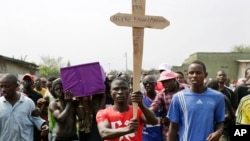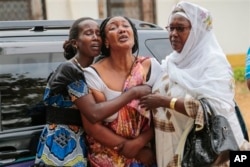Amnesty International released a report saying Burundian authorities repressed political demonstrations earlier this year as if they were an insurrection, using lethal force to silence anti-government protesters.
Sarah Jackson, Amnesty's deputy regional director for East Africa, said it is a tragedy that protesters "had to brave [face] bullets to have their voices heard."
She called on Burundian authorities to "urgently, thoroughly and transparently" investigate the use of force against the demonstrators, and bring to justice anyone found responsible.
Dozens have been killed in the unrest.
The Amnesty report said the investigation found that police shot unarmed demonstrators who were running away from them and used tear gas and live ammunition even when children were present.
The report also criticized Burundi's shutdown of the media after military officers staged an unsuccessful coup. Amnesty said police "physically attacked" independent media facilities, rendering them unable to broadcast.
According to the report, U.N. monitors have documented cases of torture and ill-treatment of protesters in detention, as well as dozens of killings of demonstrators and human rights defenders by members of the Imbonerakure militia group and security forces.
Amnesty did say some protesters used violence in response to the attacks by police. The organization is calling on the Burundian government to take action against those officers accused of attacking protesters.
President Pierre Nkurunziza's bid to seek a third-term in office has plunged the nation into its worst crisis since the end of a civil war in 2005, stoking tensions in a region with a history of ethnic conflict. Western donors and Africa states had called for polls to be delayed.
More than 170,000 Burundians have fled the nation of 10 million to refugee camps in Tanzania, Rwanda and the Democratic Republic of Congo since Nkurunziza announced his intentions to seek another term.
Observers say Nkurunziza is certain to emerge victorious from this past Tuesday’s election after running unopposed. His critics say a third term would be unconstitutional. The president and his supporters argue that a third term is permitted because he was elected by parliament, not voters, for his first five-year term in 2005.
Burundi's constitutional court has sided with Nkurunziza.
Portions of this report are from Reuters.





